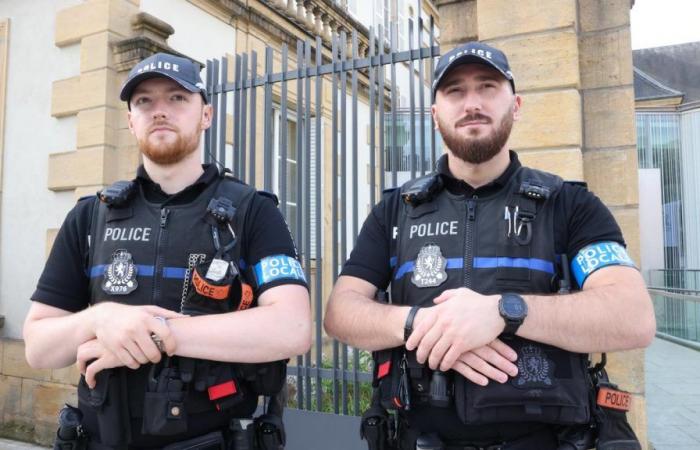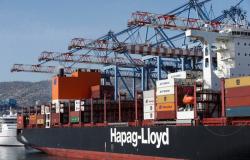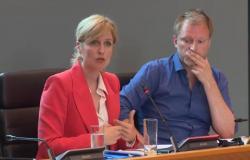What is this “local police” project?
The creation of a community police force was one of the common points of the CSV and DP programs during the last local elections (June 2023). Before also becoming part of their programs for the legislative elections last October. Then it appeared in the coalition agreement of a government that brings together these two parties. It was thus possible to read there “that a local police unit will be set up within the current body of the Grand Ducal Police, over which the mayor will have management power within the framework of his public order missions (public peace, public safety and public health).”
This is the unit that Léon Gloden (CSV), Minister of Interior Affairs, Lydie Polfer (DP), Mayor of Luxembourg, Christian Weis (CSV), Mayor of Esch-sur-Alzette, and Pascal Peters, Director General of the Grand Ducal Police, presented on Monday.
It is rather a local police unit placed under the authority of the Grand Ducal police.
Leon Gloden
Minister of Internal Affairs
“We have made various observations,” explains the minister. “The first is that, since the last police reform in 2018, the word ‘proximity’ has disappeared from the text of the law. In addition, the latest audit by the General Inspectorate of the Police also says it clearly: the police are occupied 80% of their time by interventions and only 20% by proximity work. The latter has been seriously neglected, largely due to a lack of personnel…” Hence the need to create this community police, called “local police”.
When is this pilot project launched?
When Léon Gloden launched the press conference on Monday, July 1st at 9:59 a.m., this “local police” was already at work. “It started this very morning. The first patrols must already be finished,” smiled the Minister of Internal Affairs.
For the time being, this “local police” is a pilot project lasting six months, until the end of November. “These six months will allow us to accumulate experiences. To see what works and what works less well” continued the CSV elected official. “Then, we will be able to carry out an evaluation. And, on the basis of this, draft a bill that will give a legal basis to this ‘local police’.”
At the press conference, Léon Gloden and Pascal Peters were accompanied by Lydie Polfer (left) and Christian Weis (right), the mayors of Luxembourg and Esch-sur-Alzette. © PHOTO: Anouk Antony
Where will we see this “local police”?
For the time being, this pilot project is only being carried out in two cities, both of which had mayors present: Luxembourg and Esch-sur-Alzette. Patrols will be deployed there from Monday to Saturday, as well as on some Sundays depending on operational needs.
If other municipalities find that they need it, they too can request to obtain such a service.
Leon Gloden
Minister of Internal Affairs
“But if, in the future, other municipalities find that they need it, they too will be able to request such a service,” the minister added.
How many police officers are assigned to this local police force?
In the first phase, 20 police officers are planned for the city of Luxembourg and four for that of Esch-sur-Alzette.
“At the level of the Grand Ducal Police, it seemed very clear that as soon as our numbers increased, we would have to focus on a more proactive but also preventive way of working,” explained Pascal Peters, Director General of the Grand Ducal Police. With a net reinforcement estimated at 90 men this year within the police force, “we were able to assign 20 police officers to the “local police” of Luxembourg and four to that of Esch. In order to ensure this local service,” added Léon Gloden.
“The frequency of exchanges between mayors and regional police departments will be increased. With the aim of achieving better coordination,” explains Pascal Peters. © PHOTO: Anouk Antony
It is important to clarify that this “local police” is not a new police force. “It is rather a local police unit placed under the authority of the Grand Ducal police” as Léon Gloden defined it.
The police officers of this “local police” are therefore police officers from the Grand Ducal police (from the police stations of Luxembourg and Esch-sur-Alzette) who will be assigned to this new unit. And at this level, we note that “there will be a rotation between the police officers” as Pascal Peters specified. “And this pilot project will serve in particular to determine how often this rotation will have to be carried out.”
They have no intervention mission, except in emergencies.
Pascal Peters
Director General of the Grand Ducal Police
It is also noted that these local police forces are therefore not placed under the authority of the mayors. “But the frequency of exchanges between them and the regional police departments will be increased. With the aim of obtaining better coordination” explained Pascal Peters.
“And the municipalities will not have to pay for these ‘local police’ units,” concluded the Minister of Internal Affairs.
What are the missions of this “local police”?
As said above, the men of the “local police” belong to the grand-ducal police, “with all the skills that the law gives them” explains Léon Gloden.
But when they are on patrol, their scope of action will be:
-
the maintenance of local public order in order to guarantee public safety, tranquility and health.
-
visible police presence at predefined strategic locations to ensure the safety of citizens and prevent incidents.
“They have no intervention mission, except in emergencies,” explains Pascal Peters. “What we are looking for above all is to bring the police closer to the citizens again.”
“So many people were waiting for this to finally change. We have been calling for this prevention to be implemented for years…” said Lydie Polfer, the mayor of Luxembourg. “The station district with part of Bonnevoie and the upper town are the two districts that pose the most problems. Patrols will be on site in consultation with the regional director.”
Do members of the “local police” have a distinctive sign?
Yes. The officers concerned will wear a distinctive armband with the words “local police”.
The armband worn by “local police” officers. © PHOTO: Anouk Antony






